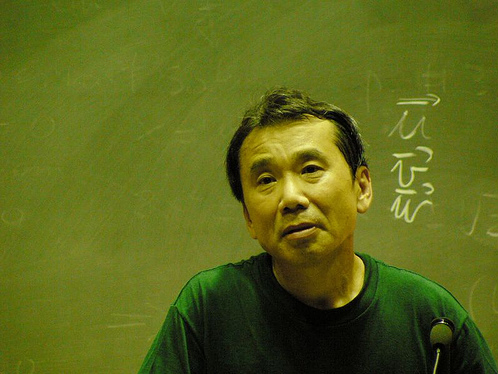Kim and I have been reading The Wind-up Bird Chronice, one of Haruki Murakami’s best-known novels, for the past couple of months. It has taken us a long time to get half-way through the book. This is my second reading, and I am surprised to find that the author’s style, themes and approach leave me feeling a sense of distance that verges on yawning boredom.
I was the one who pushed for this book on our reading list, so I am a little shocked at my response. Murakami has meant and continues to mean a great deal to me as a writer. The first stories I wrote as a young adult were little more than imitations of Murakami (and, to a lesser extent, Raymond Carver). I doubt I am alone in my generation in saying that those two authors were my greatest early inspirations.
I know the exact month and year I first read Wind-up Bird. It was between March and April of 2003, during the US “Shock and Awe” military campaign in Iraq. That was back when Portland’s anti-war marches drew thousands of people, and I was one of those young men who never missed a demonstration, partly out of ill will and of course partly from a desire to witness conflict.
Sometime after the initial US bombing of Baghdad, I read one of the long chapters in Wind-up Bird that describes Japan’s invasion of Manchuria. The chapter was horrifying. Soviet soldiers take the Japanese narrator and his party hostage, then torture and kill one of them by skinning the man alive. Murakami’s own apparent self-searching over Japan’s responsibility for the atrocities of the Manchurian War struck home with me.
Now, though, I am bored by them. And when I am not bored I am simply irritated: “Why are you repeating yourself, Murakami? Do you care about May Kasahara and Kumiko, or are they just puppets?”
Why is that? It could be me — purely. I tend to read novels once, against Navokov’s advice, so it is possible that reading the book a second time brings the old boredom out. Perhaps I am not mature enough to return over and over to the same favorites.
Yet it seems that the opposite is true, and I have grown up. After reading Wind-up Bird in 2003, I set off driving down the West Coast to visit family in southern California. I was unemployed, having been laid off from my tech job due to outsourcing, and I blubbered to my California family over all the common ills of young adulthood, most of which came down to no money and lack of purpose.
Since then, I have witnessed the death of my father, traveled to Ghana, met my loving wife, watched in horror as the dollar declined. And I saw — for the first time in my life — the man I voted for as President elected.
In the aftermath of all these big, serious life events I seem to be left wondering, why is this book so remote? It can’t just be the translation: I read all his other stuff through that gauze; even this book. No, I think it’s Murakami’s style. His chained-together dreams, the way he always seems to grope in the dark for the next invented metaphor — these tics rub against me in the sentences and pages as Kim and I read them.
What I want now is something real, something concrete, as Toru Okada, the protagonist of Wind-up Bird might say. I suppose that means it is time to buy Murakami’s latest book, which in a strange contrast to most of his work is a non-fiction title on running (with a name that puns Raymond Carver’s famous short story, “What We Talk About When We Talk About Love”).
A book on running? No supernatural underworld, unexplained phenomena, one-armed men or disappearing shadows? Oddly enough, that sounds exactly like what I want at this moment in my life.

